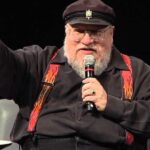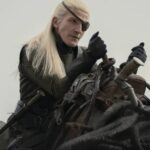One of the most memorable episodes of Game of Thrones came in the shape of the penultimate episode of season six. The episode entitled “The Battle of the Bastards” was a huge turning point in the struggle for control on the continent of Westeros. To take us through the aforementioned battle would be director Miguel Sapochnik. The helmer of this episode is one the showrunners would call upon frequently when it came to outings that contained a large scope or that are filled with the spectacular.
When it came to that said spectacular, Sapochnik never fails to amaze the audience with his ability to tame unwieldy beasts. He wrangles these gigantic episodes with an assured hand and brings epic events to life in an awesome manner. He manages to put the viewer at the center of the action in the way that few other directors succeed in doing. We have him to thank for many of the most awe-inspiring moments on the show, and he does not disappoint us here.
This episode of Game of Thrones opens up in full force, though the focus of the episode is mainly pointed towards Jon Snow (Kit Harrington) and the troubles of the North. The beginning of the ninth episode of Season 6 shows us the culmination of events that had been progressively getting out of hand at Meereen. The Essos powerhouse had been floundering for most of the season in Daenerys’ (Emilia Clarke) absence, the Khaleesi once again proves she likes to make an entrance. This short sequence gave us all a stark reminder of the power that the Stormborne can bring to the table.
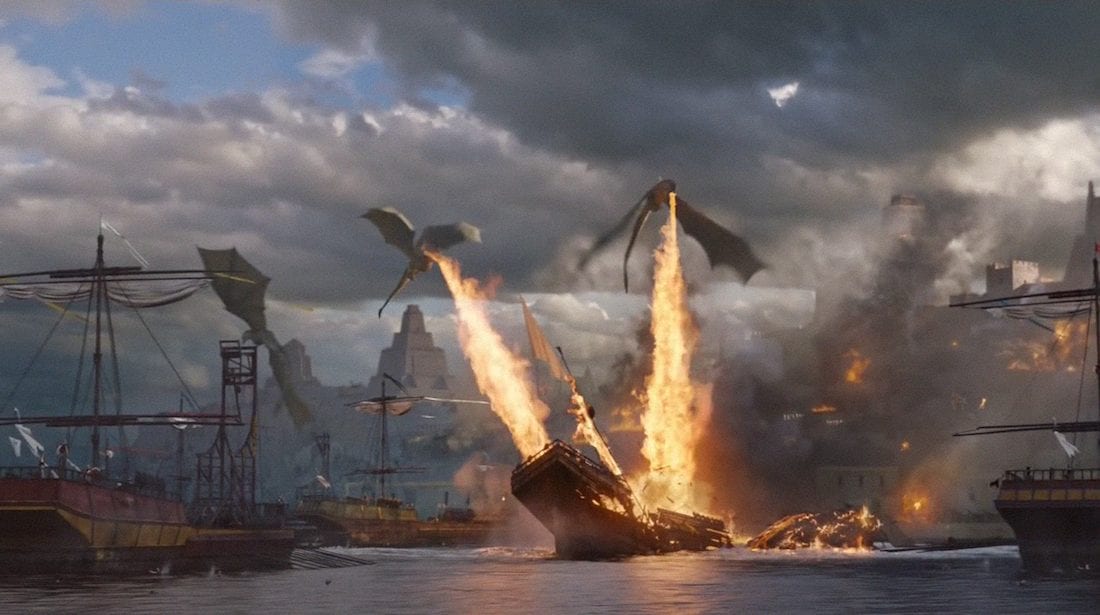
She brings her dragons down upon the approaching fleet in a manner that we would become all too familiar with as the later seasons would progress. The Khaleesi is once again reunited with her Khalasar. It is an immensely important moment for her as a woman leading in a male-dominated society such as the Dothraki. To witness her power as she and her forces lay waste to all before them is incredibly impactful and it left Daenerys in a position to finally return to Westeros.
During the opening sequence, we also see that Daenerys has joined forces with the Greyjoys from the Iron Islands. The interaction between two fierce leaders in their own right is very well done. They both show their ability for diplomacy, but also their ability to be strong and fair under pressure. This would not be the first or last time that Daenerys would take the side of the underdog. This is something that she would do throughout the show, pretty much right up until the conclusion of the entire series.
When the attention of the episode switches to the North the action really picks up. First of all, we see a meeting of the two Bastards that give the episode its title. Jon Snow and Ramsay Bolton (Iwan Rheon), the opposing sides of the same coin. The two men are clear reflections of one another, this was never more evident than in an earlier episode when Roose Bolton (Michael McElhatton) gave Ramsey, his illegitimate child from another woman, his name. The moment when the Warden of the North gave his name, future title, and everything that entails—that scene is everything that Jon Snow ever wanted from his father, to have the name Stark follow his own. It is so powerful to see this strange and distorted version of what might have been.
When Game of Thrones was at its best it, was unequaled in its ability to add layers and layers of complexity to every scene. They put so much in place to be used later on, every little piece is meticulously put in the position to construct a beautifully intricate and magnificently vast narrative. After the meeting of the minds goes exactly how one could imagine any meeting would go with Ramsay Bolton, we get to see more of these pieces delicately put in place to be used further down the road.
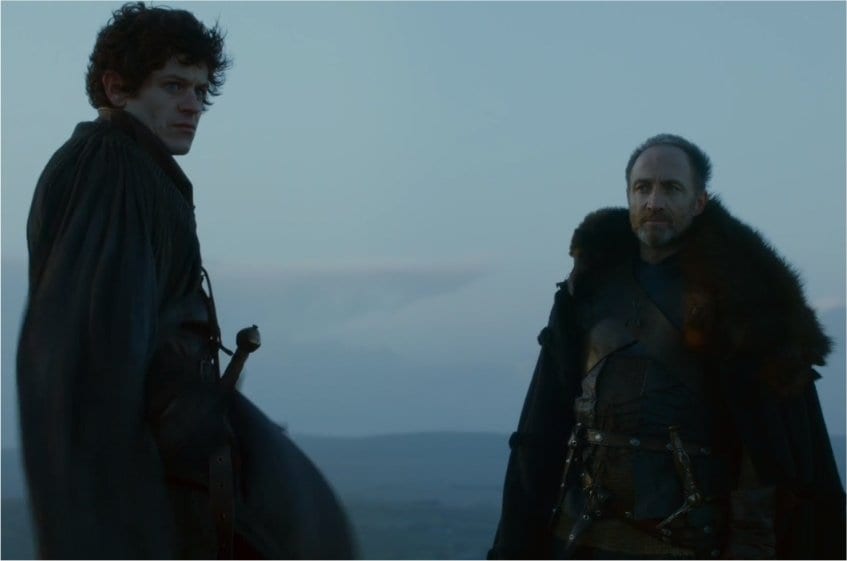


When night falls on Jon Snow’s encampment various scenes play out, interactions that would lay the groundwork for what’s to come. We see Sansa (Sophie Turner) and Jon at odds. This unease in their relationship would be something that would go on to shadow the events in the North for the next two seasons. Then we also see Ser Davos (Liam Cunningham) speak with Tormund (Kristofer Hivju) before walking the camp to ease his nerves. When he gets to the edge of the site of their encampment, the Onion Knight finds a scene where a fire was lit. His curiosity is piqued and he investigates what remains of the fire. Searching through the ashes, he finds a small wooden horse that he had given to the Princess Shireen. (Kerry Ingram) This discovery would have lasting effects for not only Ser Davos but also for the Red Woman, Melisandre (Carice van Houten).
As the day breaks, we see Jon Snow with his army at his back peering out across the battlefield that has filleted men on fiery crosses strewn about it. This is all a terrible portent of what is to follow. This battle will not be one fought with glory, but with grit and a fierce determination because they are outmatched and their enemy has shown countless times that he will show them no mercy. From the get-go we are reminded of the ramifications of failure for our protagonists. It is in moments like these that the creators of Game of Thrones prove that no one can lay the sense of anticipation on as thick as they can. Benioff and Weiss never miss out on a chance to make us all aware of how important every decision is, and how there is no room for error.
When Ramsay marches Rickon (Art Parkinson) out, just like Jon Snow and his forces, we too sit up and take notice. No character puts the audience so quickly in a state of unease as the would-be ruler of the North. His unpredictability, cunning, and sheer ruthlessness is the stuff of dramatic gold. He is a master at playing the kind of deadly chess that makes or breaks leaders time and time again in the cold and callous world that is Westeros.
We all wait with bated breath at what cruel intentions that Ramsay has in his heart for the young Stark. Then in an instant that shows us everything that makes Ramsay Ramsay, he leans into Rickon and whispers, “do you like games, little man?” His words are as much for Jon Snow as they are for Rickon. He is an expert fisherman, and now it is time to bait the hook. Ramsay lets Rickon off to run across into the awaiting arms of his half brother.
Just like on so many occasions, Jon Snow allows his heart to conquer his head and he rides out on his own. The bastard son of House Stark strides out once again, facing impossible odds, but he does not bat an eyelash. Jon Snow is the epitome of a true blue good guy. The man to make the sacrifice play without a moment’s hesitation, even though he tries his darndest to reach his loved one, all he can do is watch on in vain as Rickon is struck down.
Once again we see Jon Snow give way to reason. After bearing witness to the death of Rickon, he takes off across the battlefield, making a beeline for Ramsay at the front of his army. When Jon’s horse is taken from underneath him by archers, he finds himself all alone, watching on as Ramsay’s cavalry grows ever closer. This scene is shot so beautifully, the haunting soundtrack bringing to life the resignation that Jon Snow feels as he watches on, his impending doom charging towards him.
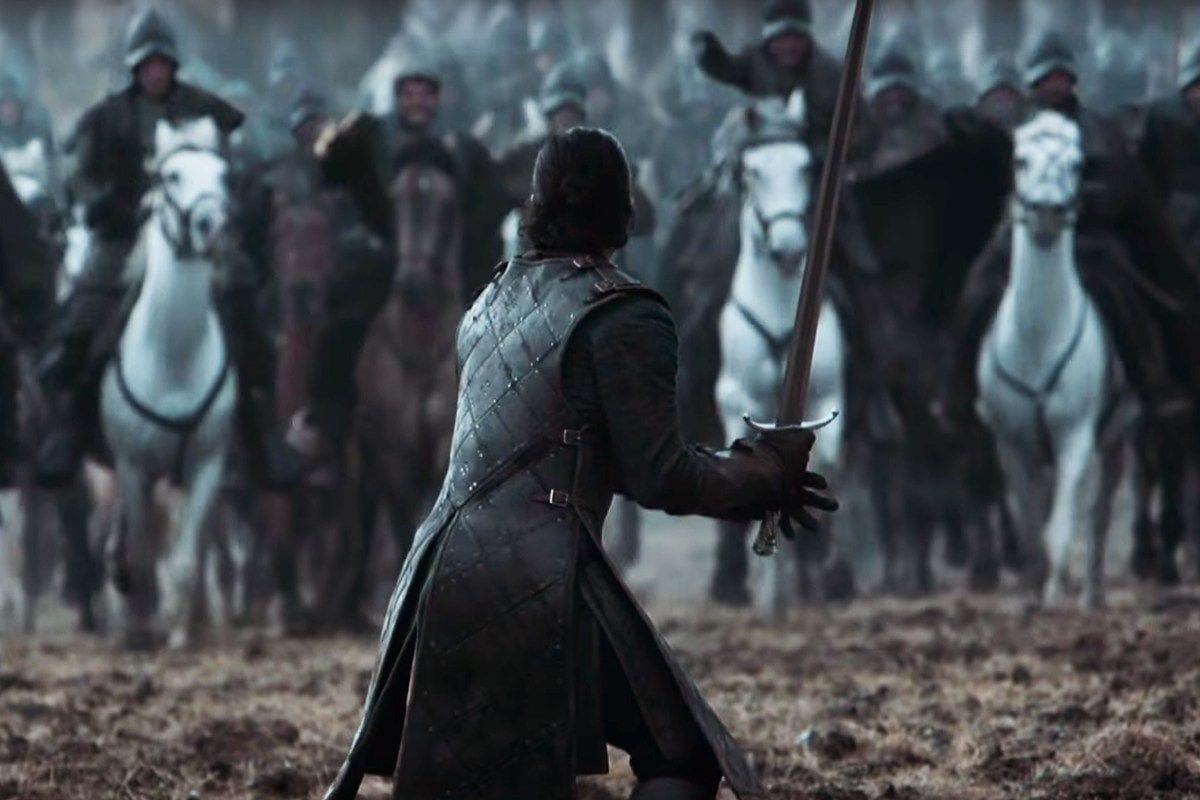


He does not flinch when others would flee. Instead, he looks down the proverbial barrel and draws his sword and readies himself to fight to his very last breath. This is the personification of Jon Snow as a man, always ready to fight alone against all of the terrors of the world. It is what happens next that shows us that Jon Snow is not just the type of leader that is willing to stand alone, we see that his troops are willing to follow him through the gates of hell.
The ensuing clash of both armies’ cavalry and the battle that follows is incredible. It is dirty, savage, up close and personal brutality. It is a very real battle in a fantastical world. It is so claustrophobic and suffocating when you watch Jon Snow disappear underneath the sheer mass of men. It is like nothing you have ever seen before. Just as you think he has met his fate, he struggles free and just like him, we too gasp for air as he escapes the clutches of the mountain of crushed humanity.
As the battle plays out, we see the aforementioned cunning of Ramsay Bolton, as tactically astute as he is barbaric. We see him now put the squeeze on. The scenes that follow are intense, Ramsay’s forces wielding large shields and spears march forward in unison. Their attacks are vicious and the fighting is filled with more of that up close brutality.
We watch on again helplessly, as Miguel Sapochnik does an immaculate job of ensuing terror in the audience. We are constantly reminded of how horrendous this style of warfare is, to cut down one’s enemies in this way must have been fraught with the most unspeakable of terrors. Just as Jon Snow, Tormund, Ser Davos and all the rest look all but dead and buried, we hear a battle horn.
When you see the Knights of the Vale come over that horizon it gives us all a moment of hope, which in Game of Thrones is the rarest of currency. This dark world has so very few fleeting moments of joy that we cling to them so dearly. The charging army led by Lord Petyr Baelish (Aidan Gillen) and Sansa Stark had stood on the sidelines as the power struggles raged throughout Westeros. This was a huge moment for both them as characters and from a narrative point of view.
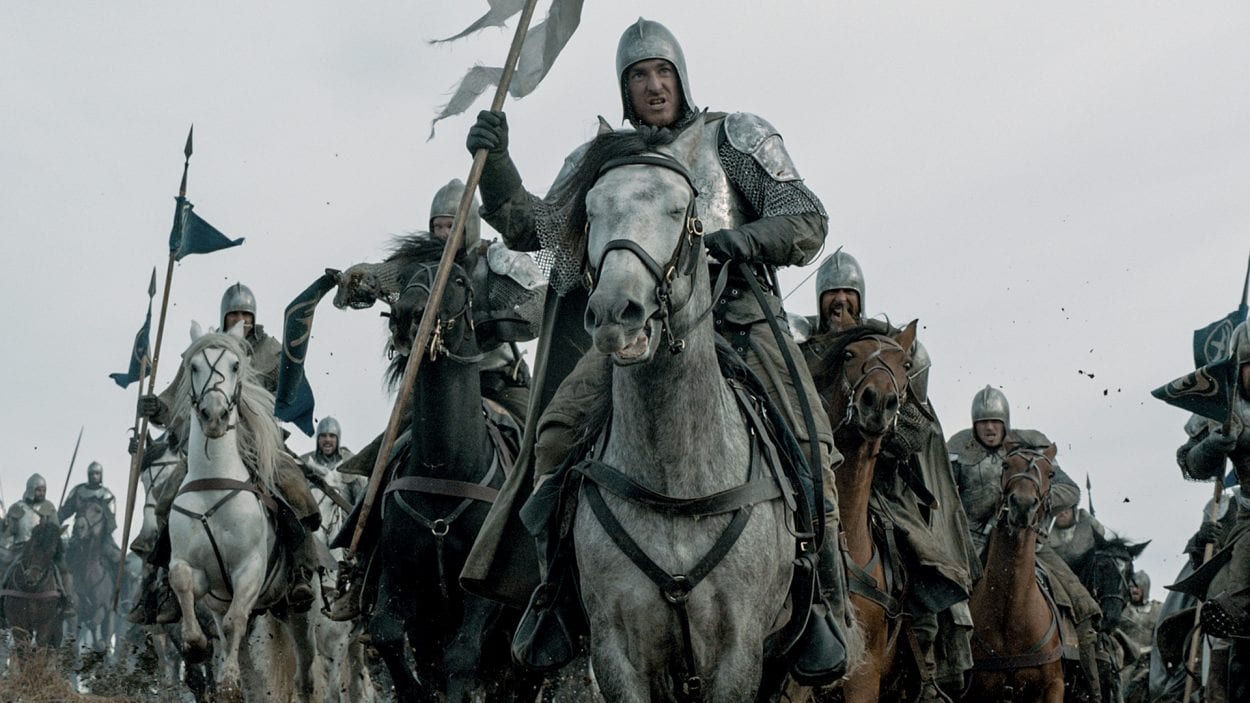


The influence of the Vale had been growing ever since the death of Lysa Aryyn (Kate Dickie). This is the culmination of years of plotting and scheming from Littlefinger, and he can not contain his glee when he watches his forces plow through Ramsay’s army. The favor that Sansa asked of Petyr would have lasting effects until the two part company at the end of Arya’s (Maisie Williams) blade.
When Ramsay sees his army in ruins, he joins the remainder of his forces in retreating to the fortress of Winterfell. Jon Snow sees this and gives chase joined by Tormund and the giant Wun Wun (Ian Whyte). The next few moments are extremely gratifying. Apart from the death of the last giant, of course, we finally get the big payoff. Jon Snow finally gets his hands on Ramsay and the beating he gives the evil little miscreant is every bit as cathartic for the viewer as it is for the character.
At the climax, we see Ramsay fed to his dogs in an act of karmic excellence. We have watched for seasons as these very same hounds have terrorized so many people at the behest of Ramsay, and now Sansa gets a modicum of justice for all that he did to her. It is a glorious act of savagery that was a befitting end for a man that knew nothing but how to be savage to people.
The Game of Thrones formula of usually the wrapping up of the season’s storyline in the penultimate episode and planning for the next in the finale was so clever. They gave you a nine-hour movie and finished it up with a one-hour teaser of what’s to come. Benioff and Weiss were the masters of building anticipation when they were at the peak of their narrative powers.
Everything that made Game of Thrones special was on show in this outing. It had drama, gore, brutal action and spectacle on the highest level that only Game of Thrones calls home on the TV side of things. It really was a monumental experience, maybe never to be matched. “The Battle of the Bastards” was an incredible episode that showed all of Game of Thrones’ strengths, wrapping up one of the most harrowing storylines of the show’s entire run with an oh-so-Westeros style happy ending.
It was intense, impactful and filled with the level of scale that made Game of Thrones the juggernaut that will be forever remembered as a titan of television. “The Battle of the Bastards” gave us a glimpse of the potential of not just Game of Thrones but of television shows as a whole. It was an ambitious story told to perfection, a cacophony of creativity brought to a carefully crafted conclusion. There are a few episodes that epitomize all that made Game of Thrones such a standout show and “The Battle of the Bastards” was well and truly one of them.



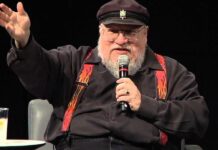
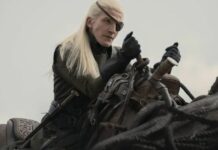
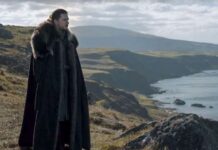














![[Book Review] The Blade Itself (The First Law Trilogy) by Joe Abercrombie](https://bendthekneegot.com/wp-content/uploads/2018/01/1516047103_maxresdefault-218x150.jpg)








